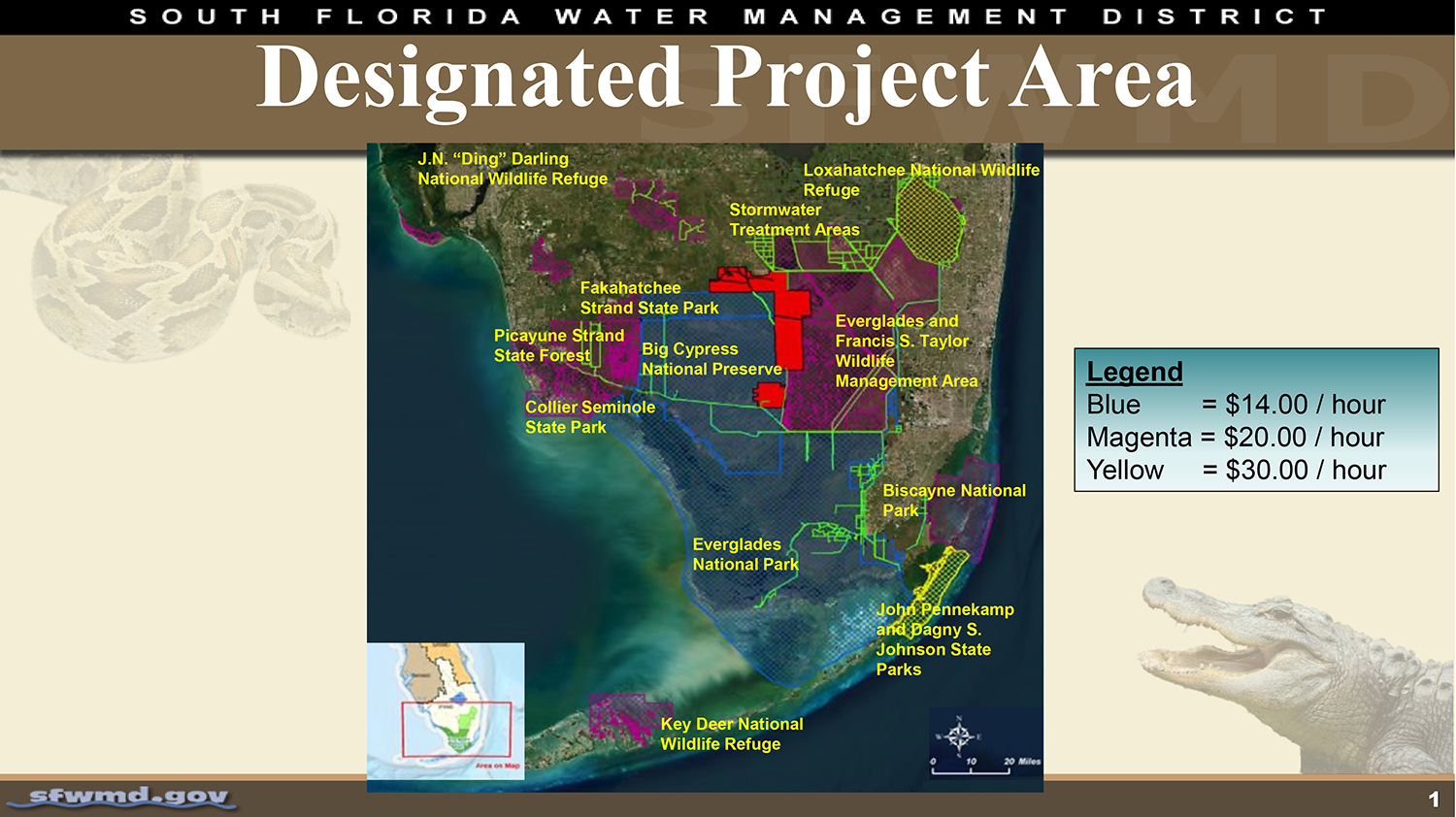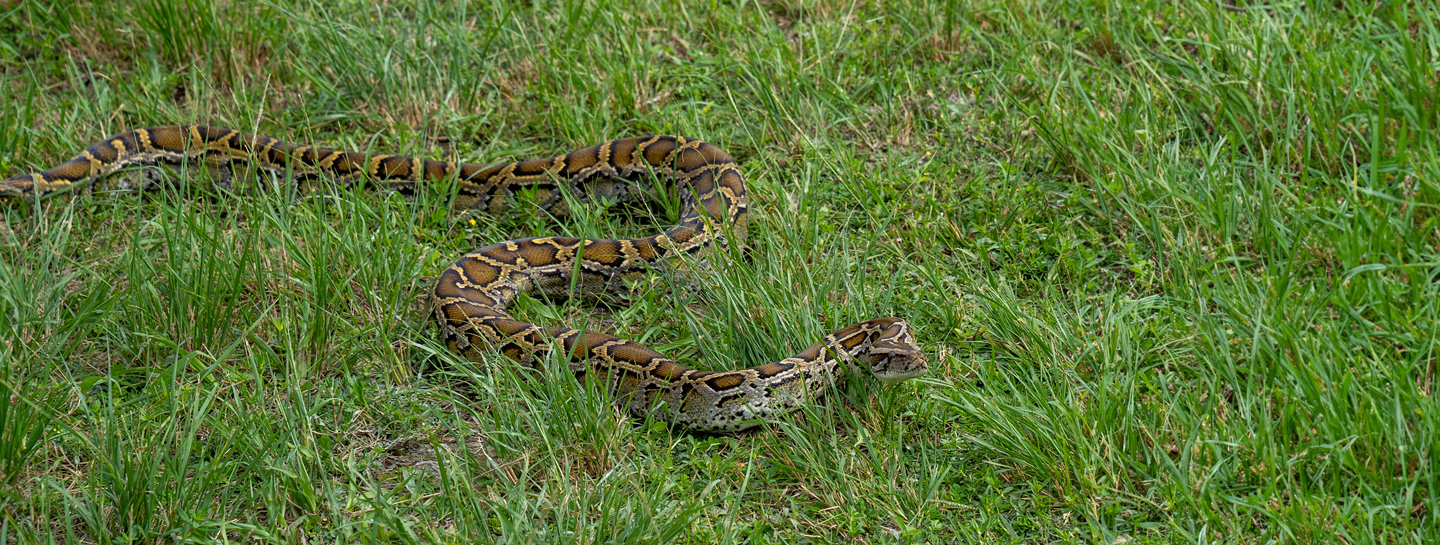Python Elimination Program
Invasive pythons threaten our precious native ecosystem by preying upon the wildlife that lives there, including wading birds, mammals, and other reptiles. Every python that is removed and eliminated is making a difference to protect the Everglades and South Florida’s diverse and native wildlife. Invasive pythons are one of the most destructive and harmful species in America’s Everglades. Their aggressive predation on native wildlife robs panthers, raptors, bobcats, and other native predators of their primary food sources.
The South Florida Water Management District continues to expedite Everglades restoration efforts and we will continue working to protect South Florida’s natural resources and combat invasive species like Burmese pythons.
More than 850 participants joined the effort to remove invasive Burmese pythons from the Everglades ecosystem during the 2024 Florida Python Challenge, eliminating nearly 200 destructive pythons from public lands in South Florida.
Are you interested in contributing to this effort?
The Python Elimination Program is now accepting applications for new python removal agents. Python removal agents work on designated lands across South Florida, including in Monroe, Miami-Dade, Broward, Collier, Hendry, Lee, and Palm Beach counties. Due to the high volume of applications we receive, we are unable to respond to every applicant. We will contact you if you are selected. Otherwise, your application will remain under consideration for when future positions become available.
Click on the links below to learn more.
Background
Burmese pythons were first sighted in the Florida Everglades in the 1970s. Their introduction to Florida is a result of the pet trade. Once sought-after commodities, pythons have been sold by breeders as pets or showpieces to exotic animal collectors for decades. They made their way into Florida's Everglades by accidental or intentional releases by pet owners. Since making their way into the bountiful grounds of the Everglades, these giant constrictors have thrived, assuming a top position on the food web.
Once confined to Everglades National Park and Miami-Dade County, pythons now span across much of South Florida. Pythons exist from Monroe to Palm Beach counties, and from western Broward County to Collier County. The cryptic nature of this species makes their spread difficult to track and hampers the ability of scientists to accurately estimate their population size.
Pythons prey upon a variety of native wildlife including the endangered Key Largo wood rat. Their diet consists mainly of mammals, but also includes birds and reptiles. Through predation, pythons directly influence food webs by reducing native animal populations and robbing predators like panthers, bobcats, and alligators of their primary food sources. In addition to direct predation of native wildlife, pythons also act as vectors of parasites and pathogens which infect native animals.
A 2015 study by the United States Geological Survey, Florida Fish and Wildlife Conservation Commission and the University of Florida researched invasive pythons' impact on indigenous food sources. Researchers released 95 adult marsh rabbits in areas of the Everglades known to harbor pythons. Within 11 months of the release, the study showed that pythons accounted for 77 percent of rabbit deaths, reducing prey for native predators.
For a more in-depth summary of Burmese pythons and their impacts in Florida please see the below related publications:
- Burmese pythons in Florida: A synthesis of biology, impacts, and management tools
-
Parasite spillover: indirect effects of invasive Burmese pythons
-
Telescoping prey selection in invasive Burmese pythons spells trouble for endangered rodents
Program Details
Python removal agents are paid:
- An hourly rate of either $14.00 per hour, $20.00 per hour, or $30.00 per hour depending on the area for up to ten (10) hours each day while actively searching for pythons on designated lands.
- An additional incentive payment of $50.00 for each python measuring up to four (4) feet plus an extra $25.00 for each foot measured above four (4) feet. See example below.
- An additional $200.00 for each verified active nest.

Python Tracker
The charts below track the ongoing progress of program python removal agents. The charts are updated as python removal agents turn in pythons to SFWMD staff for measurement.
TOTAL PYTHONS ELIMINATED
SFWMD and FWC Running Total Combined as of December 2025

LENGTHS (IN FEET) OF PYTHONS ELIMINATED
SFWMD and FWC Running Total Combined as of December 2025

News, Videos and More
Find out the latest news and updates about SFWMD's Python Elimination Program.
2024
- DYK: 2024 Florida Python Challenge™ Another Huge S-S-S-Success (September 24, 2024)
- DYK: 2024 Florida Python Challenge® Kicks Off This Week - Working Together to Eliminate Invasive Burmese Pythons (August 6, 2024)
- DYK: 2024 Florida Python Challenge® Takes Place Aug. 9-18 - Florida Python Challenge® Continues to Raise Awareness About the Importance of Combating Invasive Species (June 4, 2024)
- Lieutenant Governor Jeanette Nuñez Announces Registration Is Open for the 2024 Florida Python Challenge (May 30, 2024)
2023
- DYK: 2023 Florida Python Challenge® a Huge S-S-S-Success (September 19, 2023)
- Lieutenant Governor Jeanette Nuñez Announces Winners of the 2023 Florida Python Challenge® (September 15, 2023)
- DYK: Working Together to Eliminate Invasive Burmese Pythons (August 1, 2023)
- DYK: 2023 Florida Python Challenge® Takes Place Aug. 4-13 (May 30, 2023)
- Governor Ron DeSantis Announces 2023 Florida Python Challenge® (May 24, 2023)
- DYK: Invasive Species Awareness Week Highlights Importance of Protecting Public Lands and Removing Destructive Pythons (February 21, 2023)
2022
- DYK: 2022 Florida Python Challenge® Breaks Record (November 1, 2022)
- DYK: Removing Invasive Pythons from the Everglades Protects Native Species and Ecosystems (June 21, 2022)
2021
2020
- SFWMD, FWC Hunters Remove Record Breaking Invasive Python from the Everglades (October 8, 2020)
- FWC, SFWMD announce milestone in effort to restore the Everglades: 5,000 Burmese pythons removed (July 28, 2020)
- 80 pythons submitted during the 2020 Python Bowl! (January 25, 2020)
- Florida Python Challenge™ 2020 Python Bowl Awards Celebration Jan. 25 (January 24, 2020)
- Florida Python Challenge™ 2020 Python Bowl Kickoff Event Jan. 10 (January 7, 2020)
2019
- Gov. Ron DeSantis Directs SFWMD Governing Board to Expand Python Elimination Program (September 12, 2019)
- SFWMD Python Hunters Nearing 2,000 Snakes Eliminated (January 23, 2019)
2018
- Ssssseventeen (and a Half) Feet of Snake Sets Python Program Record (November 7, 2018)
- SFWMD Python Hunts = Two Miles of Invasive Snakes Eliminated (October 5, 2018)
2017
2024
- Now in its 11th year, Florida Python Challenge continues goal to stabilize Everglades ecosystem (August 16, 2024)
- Here’s why snake hunters from across the U.S. are wading into the Florida Everglades (August 14, 2024)
- A scaly challenge like none other (August 1, 2024)
- Florida is paying bounty hunters to control its python population (March 19, 2024)
2023
- Hunting the hunters (December 14, 2023)
- Florida’s War With Invasive Pythons Has a New Twist (August 18, 2023)
- Using GIS to Control a Big Snake Problem in the Everglades (Summer 2023)
- South Florida Geospatial Team Advances Everglades Python Removal Program (May 17, 2023)
- Invasion of the Burmese Pythons, part 1 (April 25, 2023)
2021
- Invasive pythons slither north in Florida Everglades: May mean snake 'population is expanding' (November 15, 2021)
- SFWMD Python Elimination Program: The Protector of the Everglades (January 8, 2021)
2019
- Florida python hunter brings passion to war against invasive species (December 6, 2019)
- The Snakes That Ate Florida – July 2019
2018
Monthly Bonus Program
The District is now offering monthly bonuses to any District python removal agent that qualifies. The payment structure below outlines the existing hourly rates and incentives.
- Variable hourly survey rate based on location, (10 billable hours / day)
- Regular Pay $14/hour
- Premium Pay $20/hour
- Ultra-Premium Pay $30/ hour
- An additional incentive is paid for every python removed based on length. $50 for the first four feet and $25 / foot for every foot after four.
- $200 payment for any verified active python nest.
- $50 payment for the documented catch and release of any telemetered research pythons.
- Monthly bonuses are awarded for most pythons caught ($600), the longest python caught ($400), and additional bonuses between $300 and $1,500 are awarded for reaching variable capture goals, which are determined each month.

Frequently Asked Questions
Pythons are non-native, invasive snakes that are established and spreading throughout South Florida. The removal of pythons is crucial to preserve native wildlife and ecosystems. These large constrictors consume native animals, such as marsh rabbits, deer, wading birds and even alligators. Their aggressive predation has led to population declines of native mammals – robbing native predators, such as panthers, raptors, alligators, and bobcats of their primary food sources. Additionally, pythons are a vector for invasive parasites and pathogens, like Raillietiella orientalis, a lung-dwelling pentastome that is typically lethal for native snakes.
- Burmese Python (Python molurus bivittatus)
- Northern African Python (Python sebae sebae)
- Reticulated Python (Python reticulatus)
- Southern African Python (Python sebae natalensis)
- Amethystine/Scrub Python (Morelia amethistina)
- Boa Constrictor (Boa constrictor)
- Yellow Anaconda (Eunectes notaeus)
- Green Anaconda (Eunectes murinus)
- Beni Anaconda (Eunectes beniensis)
- DeSchauensee’s Anaconda (Eunectes deschauenseei)
To be eligible, python removal agents must:
- Be at least eighteen (18) years of age
- Possess a valid driver's license
- Possess a valid email address
- Have a bank account for direct deposit
- Have an iOS or Android mobile device that allows for download and utilization of the required Program Software
- Consent to be tracked using the GPS tracking app
- Sign a waiver of liability
- Have not been convicted of a felony or wildlife-related offense within the last seven (7) years
- Consent to submit to a criminal background check
- Consent to using the program software
There are limited positions available, and we maintain up to fifty (50) contractors.
Python removal agents have independent access to Everglades and Francis S. Taylor Wildlife Management Area, Big Cypress National Preserve, Everglades National Park, Frog Pond and Rocky Glades Public Small Game Hunting Areas, and other designated lands in South Florida.
Python removal agents receive $13.00 per hour, $18.00 per hour, or $30.00 per hour depending on the area for up to ten (10) hours each day while actively searching for pythons on designated lands. For all eliminated pythons, the District will make an additional payment per python: $50.00 for pythons measuring up to four (4) feet, and an extra $25.00 for every foot measured above four (4) feet. See example below:

Python removal agents must provide all their own equipment necessary to engage in program activities.
Yes. Firearm use must be consistent with the terms of the Florida Fish and Wildlife Conservation Commission (FWC) permit issued to SFWMD, as well as local, State and Federal regulations.
Python removal agents are required to download and utilize free cloud-based time and GPS tracking software, along with an electronic data collection system, on their GPS-enabled mobile device while conducting surveys. These are the methods used to verify python removal agent's time and location while engaging in program activities.
Yes. Python removal agents may bring up to three (3) unpaid assistants with them while engaging in program activities. Before being allowed to accompany python removal agents during program activities, each assistant must:
- Submit a photocopy of their ID
- Submit to criminal background screening
- Sign a liability waiver
- Be at least 18 years old
- Have prior approval by the SFWMD project manager
Members of the public may remove pythons from private lands with landowner permission, and from certain public lands with no permit required. However, because Burmese pythons are a regulated species, they cannot be transported alive and must be humanely euthanized on-site. For more information on removing Burmese pythons on public and private lands, please visit the Florida Fish and Wildlife Conservation Commission's website at myfwc.com/python.
No. Only designated Python Removal Agents are eligible for compensation in the Python Elimination Program.



